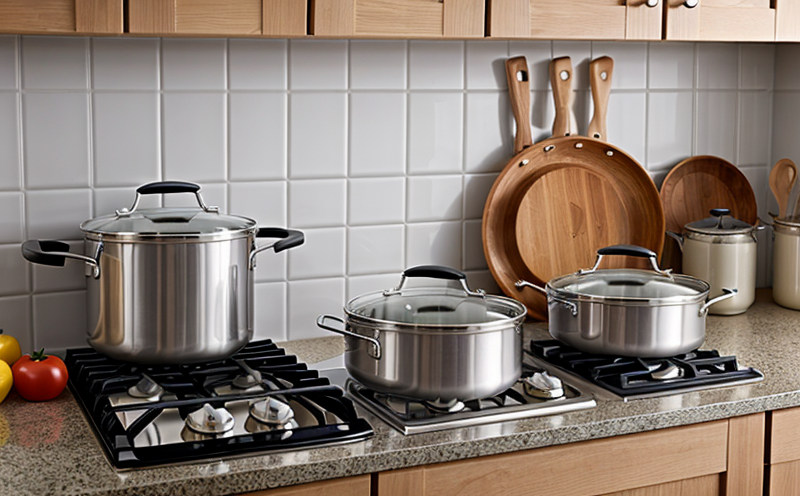Valve Functionality Testing in Pressure Cookware
Pressure cookers are essential kitchen appliances that have been around since the 1870s. Over the years, improvements in design and materials have made these devices safer and more efficient. One of the key components responsible for a pressure cooker's operation is its safety valve. The functionality of this valve ensures that the device operates within safe parameters, preventing accidents and ensuring user satisfaction.
The valve in pressure cookware serves multiple critical functions:
- It maintains the internal pressure by releasing excess steam when necessary,
- It signals when the desired pressure level has been reached,
- It prevents overpressure that could lead to explosions or other hazards.
The testing of these valves is crucial for manufacturers and quality assurance teams. It ensures that consumers can trust these products, which are often used with children present in the kitchen. Compliance with international standards such as ISO 6892-1:2013 and ASTM E578-14 is essential to guarantee the safety of consumers.
The valve testing process involves several stages, including:
- Initial Inspection: Visual inspection for any visible damage or defects,
- Leakage Test: Ensuring no leakage when pressure is applied,
- Burst Pressure Test: Determining the maximum safe operating pressure before failure,
- Sealing Test: Checking if the valve can maintain a seal under various pressures.
The testing apparatus used for this process includes specialized equipment that can simulate real-world conditions. This ensures accurate results and compliance with regulatory requirements. The valves are subjected to rigorous testing to ensure they meet strict performance criteria, which include but are not limited to:
- No leakage under specified pressures,
- Correct opening pressure as per the manufacturer's specifications,
- Reliability and durability over multiple cycles.
The importance of valve functionality testing cannot be overstated. A faulty valve can lead to dangerous situations, causing injuries or even death. By ensuring that valves function correctly, manufacturers protect users from potential hazards, thereby enhancing product safety and reputation.
Why It Matters
The proper functioning of the valve in pressure cookware is not just a technical detail; it's a matter of life and safety. The valve ensures that the pressure inside the cooker does not exceed safe limits, which prevents accidents like explosions or burns. This critical component plays a key role in maintaining the integrity and reliability of the product.
From a consumer perspective, the functionality of the valve translates directly into peace of mind. Knowing that their kitchen appliances are designed with safety in mind can significantly reduce anxiety about using them. For manufacturers and quality assurance teams, ensuring valve functionality is part of broader efforts to maintain brand reputation and comply with regulatory standards.
Non-compliance with testing protocols or skipping critical tests can lead to serious consequences. For instance, a recall due to faulty valves could damage the manufacturer's reputation, leading to financial losses and potential legal liabilities. On the other hand, rigorous valve functionality testing contributes positively to brand image and market position by demonstrating a commitment to safety.
Given these implications, it is imperative for manufacturers to invest in robust quality assurance processes that include comprehensive valve functionality testing. This not only protects consumers but also helps in building long-term trust and loyalty among customers.
Why Choose This Test
- Enhanced Safety: Ensures that the pressure cooker operates within safe parameters, preventing accidents,
- Regulatory Compliance: Meets international standards such as ISO 6892-1:2013 and ASTM E578-14,
- Improved Product Reputation: Builds trust with consumers by demonstrating a commitment to safety,
- Cost Efficiency: Avoids the cost of recalls or product liability issues due to faulty components,
- Innovation Support: Allows manufacturers to innovate without compromising on safety standards,
- User Satisfaction: Ensures that users feel secure when using their kitchen appliances,
- Durability: Tests the valve's ability to withstand repeated use over time,
- Innovation in Design: Supports advancements in technology and material science.
By choosing valve functionality testing, manufacturers can ensure that their products not only meet but exceed safety standards. This commitment to quality enhances both brand reputation and user satisfaction, making it a wise investment for any company involved in the production of pressure cookware.
Customer Impact and Satisfaction
The valve functionality test has a direct impact on customer satisfaction by ensuring that products are safe and reliable. Consumers trust brands that prioritize safety, which can lead to increased loyalty and repeat purchases. By investing in comprehensive testing, manufacturers demonstrate their commitment to quality and user well-being.
A faulty valve can cause significant harm, leading to accidents or even fatalities. Such incidents not only affect the user but also tarnish the brand's reputation. Therefore, rigorous testing is crucial for maintaining a positive image in the market. It reassures customers that they are using products designed with their safety in mind.
Moreover, customer satisfaction extends beyond individual products; it encompasses overall trust in the brand. Brands that consistently meet or exceed safety standards build strong relationships with consumers. This loyalty can translate into higher sales and broader market acceptance. In a competitive industry, such positive feedback is invaluable for long-term growth.
In summary, valve functionality testing plays a vital role in enhancing customer satisfaction by ensuring product reliability and safety. It not only protects users but also strengthens the brand's position in the marketplace.





